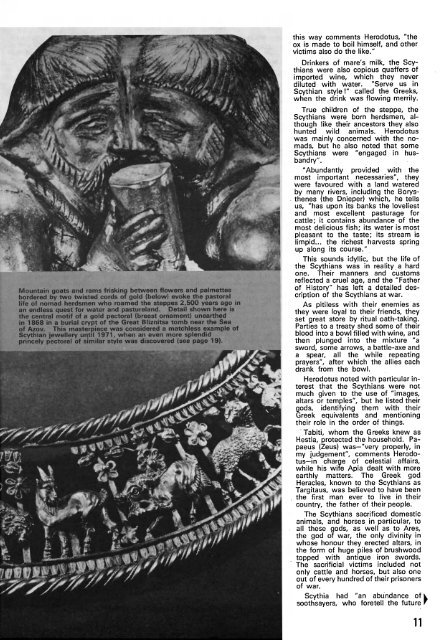The Scythians: nomad goldsmiths of the open steppes; The ...
The Scythians: nomad goldsmiths of the open steppes; The ...
The Scythians: nomad goldsmiths of the open steppes; The ...
You also want an ePaper? Increase the reach of your titles
YUMPU automatically turns print PDFs into web optimized ePapers that Google loves.
Mountain goats and rams frisking between flowers and palmettes<br />
bordered by two twisted cords <strong>of</strong> gold (below) evoke <strong>the</strong> pastoral<br />
life <strong>of</strong> <strong>nomad</strong> herdsmen who roamed <strong>the</strong> <strong>steppes</strong> 2,500 years ago in<br />
an endless quest for water and pastureland. Detail shown here is<br />
<strong>the</strong> central motif <strong>of</strong> a gold pectoral (breast ornament) unear<strong>the</strong>d<br />
in 1868 in a burial crypt <strong>of</strong> <strong>the</strong> Great Bliznitsa tomb near <strong>the</strong> Sea<br />
<strong>of</strong> Azov. This masterpiece was considered a matchless example <strong>of</strong><br />
Scythian jewellery until 1971, when an even more splendid<br />
princely pectoral <strong>of</strong> similar style was discovered (see page 19).<br />
this way comments Herodotus, "<strong>the</strong><br />
ox is made to boil himself, and o<strong>the</strong>r<br />
victims also do <strong>the</strong> like."<br />
Drinkers <strong>of</strong> mare's milk, <strong>the</strong> Scy¬<br />
thians were also copious quarters <strong>of</strong><br />
imported wine, which <strong>the</strong>y never<br />
diluted with water. "Serve us in<br />
Scythian style !" called <strong>the</strong> Greeks,<br />
when <strong>the</strong> drink was flowing merrily.<br />
True children <strong>of</strong> <strong>the</strong> steppe, <strong>the</strong><br />
<strong>Scythians</strong> were born herdsmen, al¬<br />
though like <strong>the</strong>ir ancestors <strong>the</strong>y also<br />
hunted wild animals. Herodotus<br />
was mainly concerned with <strong>the</strong> no¬<br />
mads, but he also noted that some<br />
<strong>Scythians</strong> were "engaged in hus¬<br />
bandry".<br />
"Abundantly provided with <strong>the</strong><br />
most important necessaries", <strong>the</strong>y<br />
were favoured with a land watered<br />
by many rivers, including <strong>the</strong> Borys<strong>the</strong>nes<br />
(<strong>the</strong> Dnieper) which, he tells<br />
us, "has upon its banks <strong>the</strong> loveliest<br />
and most excellent pasturage for<br />
cattle; it contains abundance <strong>of</strong> <strong>the</strong><br />
most delicious fish; its water is most<br />
pleasant to <strong>the</strong> taste; its stream is<br />
limpid... <strong>the</strong> richest harvests spring<br />
up along its course."<br />
This sounds idyllic, but <strong>the</strong> life <strong>of</strong><br />
<strong>the</strong> <strong>Scythians</strong> was in reality a hard<br />
one. <strong>The</strong>ir manners and customs<br />
reflected a cruel age, and <strong>the</strong> "Fa<strong>the</strong>r<br />
<strong>of</strong> History" has left a detailed des¬<br />
cription <strong>of</strong> <strong>the</strong> <strong>Scythians</strong> at war.<br />
As pitiless with <strong>the</strong>ir enemies as<br />
<strong>the</strong>y were loyal to <strong>the</strong>ir friends, <strong>the</strong>y<br />
set great store by ritual oath-taking.<br />
Parties to a treaty shed some <strong>of</strong> <strong>the</strong>ir<br />
blood into a bowl filled with wine, and<br />
<strong>the</strong>n plunged into <strong>the</strong> mixture "a<br />
sword, some arrows, a battle-axe and<br />
a spear, all <strong>the</strong> while repeating<br />
prayers", after which <strong>the</strong> allies each<br />
drank from <strong>the</strong> bowl.<br />
Herodotus noted with particular in¬<br />
terest that <strong>the</strong> <strong>Scythians</strong> were not<br />
much given to <strong>the</strong> use <strong>of</strong> "¡mages,<br />
altars or temples", but he listed <strong>the</strong>ir<br />
gods, identifying <strong>the</strong>m with <strong>the</strong>ir<br />
Greek equivalents and mentioning<br />
<strong>the</strong>ir role in <strong>the</strong> order <strong>of</strong> things.<br />
Tahiti, whom <strong>the</strong> Greeks knew as<br />
Hestia, protected <strong>the</strong> household. Papaeus<br />
(Zeus) was"very properly, in<br />
my judgement", comments Herodo¬<br />
tus charge <strong>of</strong> celestial affairs,<br />
while his wife Apia dealt with more<br />
earthly matters. <strong>The</strong> Greek god<br />
Heracles, known to <strong>the</strong> <strong>Scythians</strong> as<br />
Targitaus, was believed to have been<br />
<strong>the</strong> first man ever to live in <strong>the</strong>ir<br />
country, <strong>the</strong> fa<strong>the</strong>r <strong>of</strong> <strong>the</strong>ir people.<br />
<strong>The</strong> <strong>Scythians</strong> sacrificed domestic<br />
animals, and horses in particular, to<br />
all <strong>the</strong>se gods, as well as to Ares,<br />
<strong>the</strong> god <strong>of</strong> war, <strong>the</strong> only divinity in<br />
whose honour <strong>the</strong>y erected altars, in<br />
<strong>the</strong> form <strong>of</strong> huge piles <strong>of</strong> brushwood<br />
topped with antique iron swords.<br />
<strong>The</strong> sacrificial victims included not<br />
only cattle and horses, but also one<br />
out <strong>of</strong> every hundred <strong>of</strong> <strong>the</strong>ir prisoners<br />
<strong>of</strong> war.<br />
Scythia had "an abundance <strong>of</strong> |<br />
soothsayers, who foretell <strong>the</strong> future I<br />
11

















